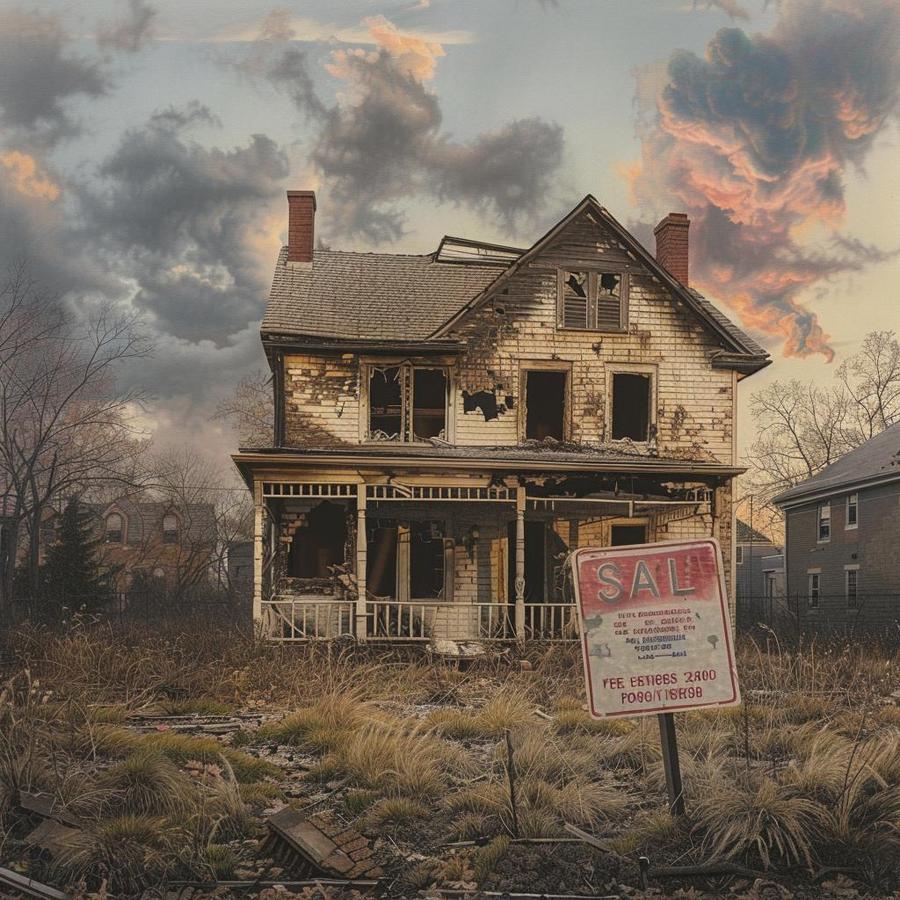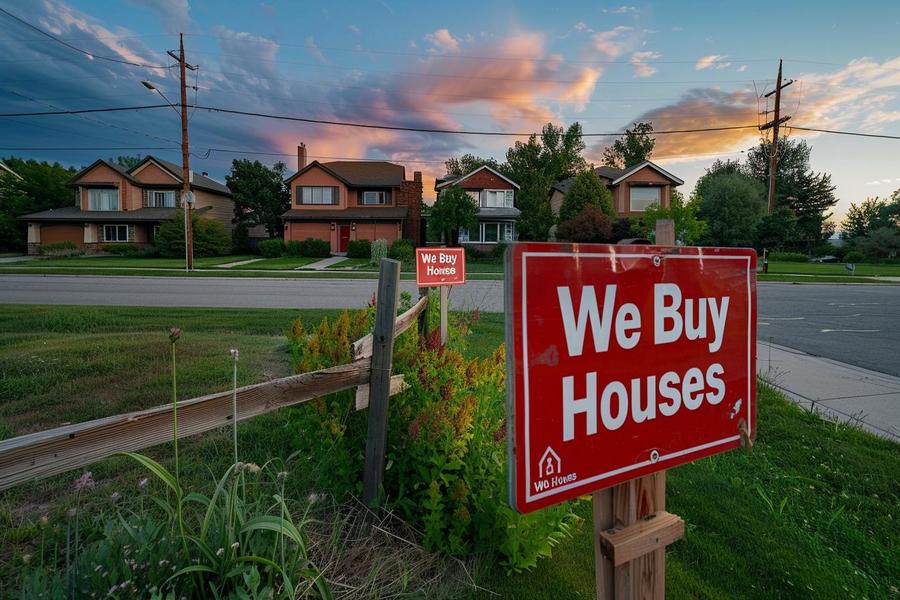Selling a fire-damaged house seems tough, right? But it can be simple. This guide shows you how. We'll talk about who buys these homes and the best way to sell fast. You won't need to fix anything. Learn to get cash without the long wait. Let's dive into making this sale easy for you.
TL;DR:
- Selling a fire-damaged house as-is avoids repair costs and speeds up the sale, attracting investors.
- Understanding the extent of fire damage and restoration costs is crucial before selling.
- Disclosing fire damage truthfully to potential buyers is legally required and builds trust.
- The market value of a fire-damaged home can be influenced by its location and the cost of necessary repairs.
- Options for selling include auctions, direct sale to investors, or using a specialized real estate agent to navigate the sale process effectively.
- Considering FHA 203k loans can be beneficial for buyers interested in financing fire-damaged properties.
Why Consider Selling Your Fire-Damaged House As-Is?
What Are the Benefits of Selling a House As-Is?
Selling a fire-damaged house as-is means fast deals. You skip repairs and sell quick. You save on costs and time. Plus, you avoid the stress of fixing it up.
Who Typically Buys Fire-Damaged Homes?
Investors often buy fire-damaged homes. They look for deals and fix them to sell again. These buyers know how to value a fire-damaged property. This is helpful for sellers.
How to Approach the As-Is Sale Process?
First, know the value of your home "as-is." Consider getting a professional opinion on repair costs. List your home, stating clearly that it's selling as-is. This attracts the right buyers, those looking to renovate or invest.
Let's dig into these points.
Knowing your home's value requires a thorough assessment. You must evaluate what repairs are needed. For this, understanding how much it would cost to fix the house is crucial. You can then price your home adequately. It helps if the house is near new developments. This can attract investors seeking opportunities. They might see potential in a fire-damaged home next to newer properties.
But watch out for unseen damages. Water used to quench the fire can cause issues. Assess these when calculating potential repair costs. If you find this task daunting, consider professional help. They can give a detailed report on the damage and repair needs.
Remember, being clear about the house's condition in your listing is key. This transparency wins trust. It ensures only serious investors, who understand the scope of work required, show interest. This way, you avoid long discussions with buyers unsure about taking on a big repair job.
How to Assess Fire Damage Before Selling?
Determining the Extent of Fire Damage
You first need to check how deep the fire damage goes. Look at the roof and inside your house. See if the fire hurt the structure. It's key to know this before you decide anything.
Understanding Fire Restoration Costs
Next, figure out how much it will cost to fix the fire damage. The cost depends on how big your house is and how bad the fire was. For a clear idea, count the cost per square foot. This helps plan your budget or decide if you want to sell as-is.
The Impact of Fire Damage on Home Value
Fire damage can lower your home's value. If your house is by a new development, that might help its value. But first, think about how much value the fire took off. This makes a big difference when you sell.
Always look into these areas a lot. They can change what your home is worth a lot. Good luck with your fire damaged home, whether you fix it or sell it as-is!
Related Links:
–Selling a House that Needs Repairs: A Guide
–How To Sell A Fixer Upper House Fast: Simple Guide
Should You Repair Fire Damage Before Selling?
Evaluating the Cost vs. Benefit of Repairs
You must check the repair costs before you sell your fire-damaged house. How much will they cost? How much would they lift the house price? Start by looking at the key spots hit hard by the fire. Focus on the roof, as you noted it had strong fire damage. But don’t forget places not as plain to view.
Find out about local repair costs. The rates can shift a lot in areas like New York or San Francisco. Try contacting a local builder. Ask for a full checkup and get a price list to fix the main issues. Weigh this against the value the repairs add to the house. Will you get back what you spend in the sale price? Often, selling the house ‘as-is’ might make more sense.
It can save you time and money, letting buyers deal with fixes. This way, you avoid the tasks of fixing it up.
Options for Selling a Fire-Damaged House Without Making Repairs
You can sell your house ‘as-is.’ This path means you won't fix the fire damage. Instead, you tell buyers they are getting the house with all its current issues. You might think this lowers the price a lot. But, there are folks out there who look for just such deals. They might be builders or flippers who aim to fix the place and sell it for more.
Be clear about the extent of the damage. It aids the sale process and keeps trust with buyers. Sell points like the spots near new growths. It could tempt a buyer who sees a big plus in the possible rise in area value. Consider looking into ways to list your fire damaged property for sale. There are online platforms and agents who deal in such homes. They match you with the right buyer who sees a good flip in your house.
Do think about each step and pick the quickest, most gainful choice. Your goal? To ease your load and make something back from a tough spot.
Disclosing Fire Damage to Potential Buyers: What You Need to Know
Legal Obligations and Disclosure Laws
You must tell buyers about any fire damage. This is true in California, Texas, and most states. Full disclosure helps avoid legal issues later. It builds trust with buyers too.
In states like California, law demands that you share all known problems with your house. This means even if the fire was small and fixed, you need to tell.
Not telling can lead to a deal falling apart or even court cases if the buyer finds out later. Home buyers can check some info online with tools such as "full disclosure requirements." It saves everyone time and stress by being honest up front.
Preparing Disclosure Documents for Buyers
To start, list all damage and repairs by date and type. Include reports from fire officials and repair receipts. If you had a pro check the fire or water impact, add that info too. This document gives a clear history of what happened and how you fixed it.
Make sure to highlight any ongoing risks. For example, if part of the roof still needs work, say it. A clear, detailed list helps buyers know exactly what they are getting.
The Impact of Disclosure on Sale Process and Negotiations
Being up front might lower your sale price offers. However, it can lead to quicker, smoother deals. Buyers like knowing what to expect. They might even value the honesty and deal with you over others.
Remember, selling a house with past fires is tough but not impossible. Clear info makes it easier for everyone. Always consider your local laws and maybe speak to a real estate expert to guide you.
How Do Fire-Damaged Home Sales Affect Property Values?
Understanding the Effects of Fire Damage on Neighborhood Property Values
When a house in your area catches fire, it can drop the property values around it. This happens because buyers often see the area as less safe or less appealing. Think about a street like Oak Street in the busy suburbs of Austin, Texas or a cozy neighborhood in Marietta, Georgia. If one house shows clear fire damage, questions arise about the safety and upkeep of neighboring properties too. Even if the damage is only to one house, the look and feel of the whole neighborhood changes.
Zillow home values for areas with fire damage can give us insights. These records show how much less people pay for houses near burned ones. The drop in prices could be short-term if the area quickly recovers. But if the fire leaves a long scar, it can take years for values to bounce back. For sellers, knowing this can guide you in adjusting your selling price. If you're selling a house after a fire, expect offers to be lower than normal market values.
Calculating Your Fire-Damaged Home's Market Value
Now, if you're dealing with your own fire-damaged property, first assess the physical damage. Look at how deep the fire affected the structure, beyond visible marks. Did the flames reach the inner parts of your house, like the beams or pipes? Also, consider damage from water used to stop the fire. Water can ruin materials and cause mold.
To find out what your fire-damaged home might sell for, you need a market analysis. Include the costs to repair key features of your house. Even intact roofs might need inspection for hidden weaknesses. Calculate these costs and compare with other homes in your area that had fires. This will help you understand your house's post-fire market price. For trusted advice on this, consider consulting property assessment resources.
This detailed assessment helps any seller decide if they should fix the house before selling or sell it as-is.
Financing Options for Buyers Interested in Fire-Damaged Properties
Exploring the FHA 203k Loan for Repair and Purchase
Getting a mortgage on a fire-damaged property? It's tough but doable. One smart move is using the FHA 203k loan. This loan wraps repair costs and the purchase price into one. It's key for homes needing fix-ups from fire damage.
What Buyers Need to Know About Financing Fire-Damaged Homes
Buying a house with previous fire damage needs careful thought. First, always check the damage degree. Ask: How deep did the fire affect the home's structure? Next, think about repair costs. Make sure you have enough funds or loan options like the FHA 203k.
In my experience, a critical step is getting a detailed inspection. This helps you grasp what repairs are urgent. Exploring areas like the roof might show heavy damage not clear at first glance. Always aim to know every nook and cranny of the damage.
Lastly, think of the location perks. Is the home near new developments? This could mean a price rise in the future. Consider such opportunities when deciding. Clear, smart planning and careful financing can turn a fire-damaged buy into a wise investment.
Selling Strategies: Auction, Real Estate Agent, or Direct Buyer?
When you need to sell your fire damaged house, you have options. Each choice fits different needs. Let's explore these.
Comparing the Benefits of Auction vs. Direct Sale to Investors
Auctions are fast. They set a fixed date for selling your house. This works great if you need quick cash. However, auctions might not get the market value. Buyers often look for deals here.
Selling directly to an investor might be your best bet. Investors often buy homes "as-is". This means you don't worry about repairs. This choice cuts out many typical sale hassles. You might wonder, who buys fire damaged homes in the USA? Many investors specialize in buying damaged properties. They see potential where others see a problem. This can be a fast and efficient route if you want to sell your house after a fire.
How Working with a Specialized Real Estate Agent Can Help
Consider using an agent skilled in selling damaged houses. They know how to find the right buyers. They can also help assess fire damage. This is key to pricing your home correctly.
For example, if the roof got hit hard by the fire but the inside is okay, the agent will factor this into the sale price. They will also help estimate how much the water damage from firefighting efforts has impacted your property. Agents can pinpoint these specifics and market your home effectively.
This knowledge makes them excellent guides through the complex process of selling a fire damaged home. Whether it's connecting with the right direct buyers or navigating auction selling, their expertise can make a significant difference.
Choosing the right selling strategy can make selling a fire damaged property less daunting and more successful.
We covered a lot in this blog, from why to sell your fire-damaged house as-is to picking the best selling strategy. Remember, selling as-is saves time and hassle. Direct buyers often offer a quick, fair cash deal, making it a solid option for many. Always weigh repair costs against selling as-is benefits. Disclosure is key to trust and smooth sales. Lastly, don't forget, every sale strategy has its pros. Think about what works best for you and your situation. Selling a fire-damaged home might seem tough, but with the right approach, it can be straightforward and rewarding.















